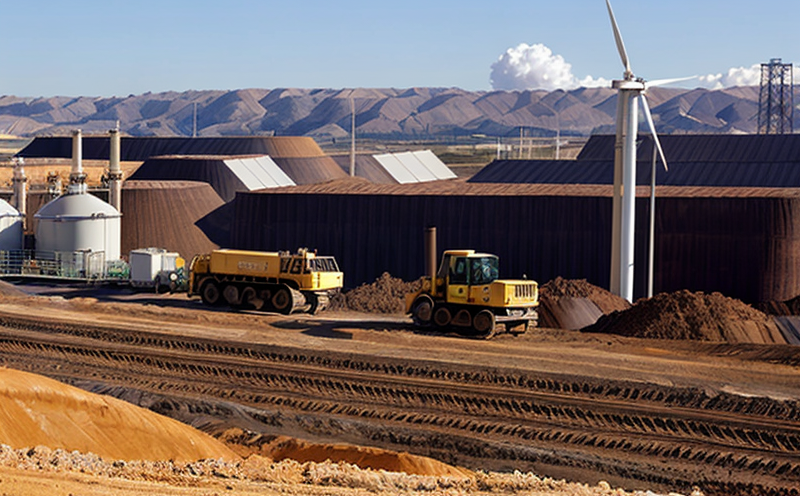GHG Protocol Emission Inventory for Mining Processes Testing
The Global Reporting Initiative (GRI) and the Greenhouse Gas (GHG) Protocol, developed by the World Resources Institute and the World Business Council on Sustainable Development, provide a framework to measure and report greenhouse gas emissions. The GHG Protocol Emission Inventory for Mining Processes Testing is an essential service that helps mining companies comply with these standards while optimizing their environmental performance.
In the context of the mining sector, where energy efficiency and resource optimization are critical factors in sustainability and profitability, accurate measurement of carbon footprints is paramount. This testing ensures transparency and accountability in emissions reporting, which is not only a regulatory requirement but also a strategic business decision for long-term success.
The service involves a detailed process to calculate the direct and indirect greenhouse gas emissions from mining operations using standardized methodologies aligned with the GHG Protocol. The primary aim is to provide actionable insights that enable companies to make informed decisions about reducing their environmental impact while maintaining operational efficiency.
Our laboratory employs state-of-the-art technology and experienced personnel to conduct this testing, ensuring precision and reliability. This includes the use of advanced software tools for data analysis and reporting that are in line with international standards such as ISO 14064-2:2018. The process begins with a thorough understanding of the client’s operations, followed by the development of a tailored methodology for emission calculation.
Key steps include:
- Data Collection: Gathering detailed information on fuel consumption, energy use, and other relevant parameters from various mining processes.
- Emission Calculation: Applying methodologies based on the GHG Protocol to quantify emissions accurately.
- Reporting: Delivering comprehensive reports that include recommendations for emission reduction strategies.
The service not only meets regulatory requirements but also supports continuous improvement in operational efficiency. By identifying areas where emissions can be reduced, mining companies can enhance their environmental stewardship and potentially reduce operational costs associated with energy use.
In conclusion, the GHG Protocol Emission Inventory for Mining Processes Testing is a cornerstone of sustainability practices in the mining industry. It provides actionable insights that drive better decision-making, ensuring compliance while contributing to global efforts towards reducing greenhouse gas emissions.
Quality and Reliability Assurance
The quality and reliability of our testing services are paramount for clients seeking accurate and trustworthy GHG emission data. We adhere strictly to the GHG Protocol standards (ISO 14064-2:2018) and ensure that all methodologies employed are transparent, replicable, and compliant with international best practices.
Our laboratory is equipped with cutting-edge analytical instruments designed specifically for emissions testing. These tools provide precise measurements that contribute to the accuracy of our reports. Additionally, we employ a team of highly qualified professionals who undergo continuous training to stay abreast of the latest developments in emission measurement techniques.
The reliability of our service extends beyond technical capabilities; it encompasses robust quality management systems and stringent internal controls. We ensure that every aspect of the testing process—from data collection to report generation—is conducted with meticulous care, ensuring consistency and reproducibility.
Client satisfaction is a key indicator of our success. Our commitment to excellence in all areas of service delivery helps us maintain long-term relationships built on trust and reliability. Regular feedback from clients further refines our processes, ensuring that we meet or exceed expectations in every test conducted.
Customer Impact and Satisfaction
The GHG Protocol Emission Inventory for Mining Processes Testing has a direct impact on the operational efficiency and environmental performance of mining companies. By identifying areas where emissions can be reduced, this service not only helps clients comply with regulatory requirements but also contributes to their broader sustainability goals.
One significant benefit is improved decision-making. Accurate emission data allows companies to prioritize investments in technologies that offer the greatest reductions in greenhouse gas emissions. This leads to more efficient use of resources and energy, ultimately contributing to cost savings without compromising production levels or quality.
Another key advantage is enhanced reputation and competitive positioning. As sustainability becomes an increasingly important factor for consumers and investors alike, companies that demonstrate a commitment to reducing their environmental impact are likely to gain a competitive edge in the marketplace. The GHG Protocol Emission Inventory can be used as evidence of these efforts, helping mining firms build trust with stakeholders.
Moreover, by participating in such testing programs, mining operations contribute positively to global climate change mitigation initiatives. This aligns with broader societal goals and demonstrates corporate responsibility, which is essential for long-term success.
The feedback we receive from our clients further reinforces the value of this service. Many have reported increased confidence in their ability to meet regulatory requirements and enhanced internal processes that support sustainability objectives. In many cases, these improvements translate into tangible benefits such as reduced operational costs and improved stakeholder relations.
Environmental and Sustainability Contributions
- Reduction of Emissions: By identifying sources of greenhouse gas emissions, this testing helps mining companies implement strategies to reduce them. This contributes directly to global efforts to mitigate climate change.
- Resource Optimization: Accurate emission data enables better resource management, leading to more efficient operations and reduced waste.
- Innovation in Technology: The insights gained from this testing can inspire innovation in mining processes, driving technological advancements that enhance environmental performance.
- Social Responsibility: Demonstrating a commitment to sustainability can improve a company’s reputation among stakeholders, including employees, customers, and investors.
- Regulatory Compliance: Ensuring compliance with international standards helps mining companies avoid penalties and maintain their licenses to operate legally.
The benefits extend beyond individual companies; they contribute to the broader goals of sustainable development. By reducing emissions and optimizing resource use, mining operations can play a crucial role in addressing global challenges such as climate change and resource depletion.





